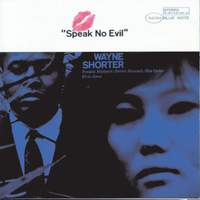Classic Recordings,
Wayne Shorter - Speak No Evil
 In one of the more prolific streaks of his career, saxophonist Wayne Shorter recorded eleven albums as bandleader for Blue Note in the period of 1964 to 1970. Shorter had already carved out quite a name for himself by the time he got around to recording Speak No Evil in 1964, as a member of Art Blakey’s Jazz Messengers from around 1959 - 1964, asserting himself as both a formidable soloist and composer. His charts are all over the album Roots & Herbs by the Jazz Messengers, and whilst Blakey would usually try to feature tunes from all members, Shorter’s works landed him the top spot among the Messengers. It was a similar story during his time with Miles Davis’s Second Quintet, and half the charts on 1967’s Miles Smiles are Shorter originals, including ‘Footprints’ (although originally recorded on Shorter’s album Adam’s Apple that same year, the version on Miles Smiles is what popularised the tune). Shorter’s contemporaries also spoke highly of his improvisational style; his fluid yet abstract playing was a perfect fit for the hard bop era, not to mention later on his fusion endeavours with Weather Report and other projects.
In one of the more prolific streaks of his career, saxophonist Wayne Shorter recorded eleven albums as bandleader for Blue Note in the period of 1964 to 1970. Shorter had already carved out quite a name for himself by the time he got around to recording Speak No Evil in 1964, as a member of Art Blakey’s Jazz Messengers from around 1959 - 1964, asserting himself as both a formidable soloist and composer. His charts are all over the album Roots & Herbs by the Jazz Messengers, and whilst Blakey would usually try to feature tunes from all members, Shorter’s works landed him the top spot among the Messengers. It was a similar story during his time with Miles Davis’s Second Quintet, and half the charts on 1967’s Miles Smiles are Shorter originals, including ‘Footprints’ (although originally recorded on Shorter’s album Adam’s Apple that same year, the version on Miles Smiles is what popularised the tune). Shorter’s contemporaries also spoke highly of his improvisational style; his fluid yet abstract playing was a perfect fit for the hard bop era, not to mention later on his fusion endeavours with Weather Report and other projects.
Speak No Evil was the third session Shorter led during this stint with Blue Note, and many of the members of his ensemble were familiar faces from his own recordings and other groups. The lineup featured Davis Quintet members pianist Herbie Hancock and bassist Ron Carter, while Elvin Jones of Coltrane’s ‘classic quartet’ fills in instead of Tony Williams; Jones had been in the studio for Coltrane’s A Love Supreme sessions just a few weeks prior to this. Jones was the only consistent player from Shorter’s other albums, 1964’s Night Dreamer and 1965’s Juju. The mercurial Freddie Hubbard, already establishing himself as the most vituosic trumpeter of his generation, completed the lineup. Shorter had assembled a familiar troupe of players for himself, well-versed in following his charts and no doubt some of the best for the job. Hubbard’s fiery tendencies make a great foil to Shorter’s comparatively cooler style, though that’s not to say Shorter doesn’t go all out when the solo calls for it. Hancock, of course, kills it on piano. At the time Hancock was only a few months away from recording his seminal Maiden Voyage (covered in a classic review earlier this year), which was actually released ahead of Speak No Evil, as it sat on the Blue Note shelf for over a year after the session on Christmas eve 1964.
Of the six albums Shorter recorded for Blue Note, Speak No Evil took a more hard bop approach, while also exploring his more painterly compositional styles; commenting on the album in the liner notes, Shorter remarked ”I was thinking of misty landscapes with wildflowers and strange, dimly-seen shapes - the kind of places where folklore and legends are born.” With titles like ‘Witch Hunt’, ‘Fee-Fi-Fo-Fum’ and ‘Wild Flower’, Shorter evokes this kind of folklore-ish setting; Shorter’s charts are moody and melodic, seldom busy, letting the melodic content speak for itself. ‘Fee-Fi-Fo-Fum’’s lumbering melody is nicely accented by the rhythm section, while the title track alternates between long, sustained notes on the head melody and a stop-start section that nicely showcases the ensemble’s tight groove, with Shorter’s solo taking a more conversational approach here. The following tune ‘Infant Eyes’, written by Shorter for his daughter, is the ballad; a rather haunting piece, with some beautiful tones from Hancock on the keys, although its ambiguous tonality grants it a slightly unsettling quality.
With some of Shorter’s unorthodox compositions - helped along by the track titles and ominous album art - giving the album a kind of folk-magic quality, Speak No Evil is an excellent point of entry into Wayne Shorter’s extensive discography. Whilst it has the accessibility of traditional hard bop, it also showcases some of the celebrated saxophonist’s more adventurous and idiosyncratic qualities.
Available Formats: CD, MP3, FLAC, Hi-Res FLAC, Hi-Res+ FLAC



